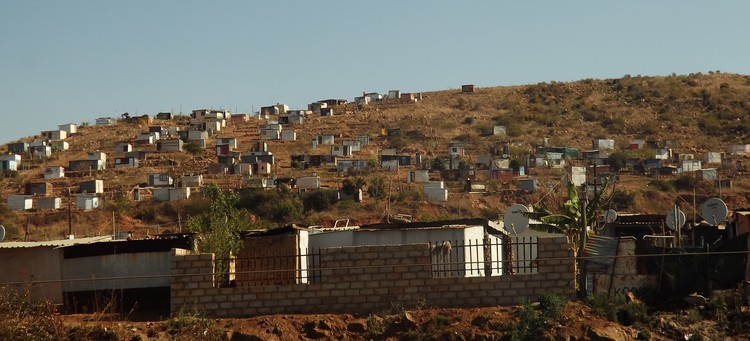There are snakes, flash floods and no basic services at Marry Me informal settlement
City of Tshwane says they will get services once the community has been formalised
Families at Marry Me informal settlement in Pretoria will soon receive services like water and toilets from the City of Tshwane. Photo: Warren Mabona
More than 300 families living at Marry Me informal settlement in Pretoria will soon receive services like water and toilets from the City of Tshwane.
The settlement got its unusual name because most of the first occupants were young and unmarried people.
According to Ward 93 Councillor, Rabasotho Masupha, Marry Me was established in 2015 and is in the process of being formalised by the municipality. “We started the formalisation process this year. We still need to determine how many people must be moved to safer places. All the basic services will be provided once the process is concluded.”
“I’m worried about those people who stay on the mountain,” said Masupha.
Residents say they have been asking the City for years to install services. They said the mountain had extremely cold conditions in winter and flash flooding during summer months. They say the mountain is also infested with snakes.
Marry Me does not have formal electricity and running water, but some residents have electrified their homes with illegal connections. Other residents have installed water pipes from the road leading to the Mamelodi township to their shacks.
“Stands and rental rooms in other townships are too expensive for us. We had nowhere to go and moved here in 2020 from Limpopo. It is very cold on this mountain in winter,” said 39-year-old Setswale Mphoka.
She lives with her boyfriend and three children aged 13, nine and three. Mphoka said they rely on the little her boyfriend makes from piece jobs and their children’s social grants. “I’m appealing to the government to move us to a proper land and give us serviced stands,” she said.
George Malungani lives with his girlfriend Lesego Ndebele and their three children. Malungani told GroundUp that he and his family have been staying in their shack since 2019. He said the dump site metres from their shack attracts snakes.
“I’m worried these snakes will bite us or our children one day. Another problem is that cars are not able to come to our homes because this mountain is not flat and has many rocks,” he said.
Malungani and Ndebele insisted that they could have built their own houses by now if the government had included them in its serviced stands project two years.
Support independent journalism
Donate using Payfast

Next: Plastic pollution: We’re getting it wrong. Here’s what needs to happen
Previous: Uber, Bolt drivers strike for two days
© 2022 GroundUp. This article is licensed under a Creative Commons Attribution-NoDerivatives 4.0 International License.
You may republish this article, so long as you credit the authors and GroundUp, and do not change the text. Please include a link back to the original article.
We put an invisible pixel in the article so that we can count traffic to republishers. All analytics tools are solely on our servers. We do not give our logs to any third party. Logs are deleted after two weeks. We do not use any IP address identifying information except to count regional traffic. We are solely interested in counting hits, not tracking users. If you republish, please do not delete the invisible pixel.

